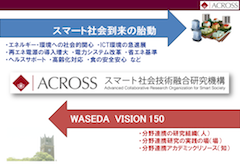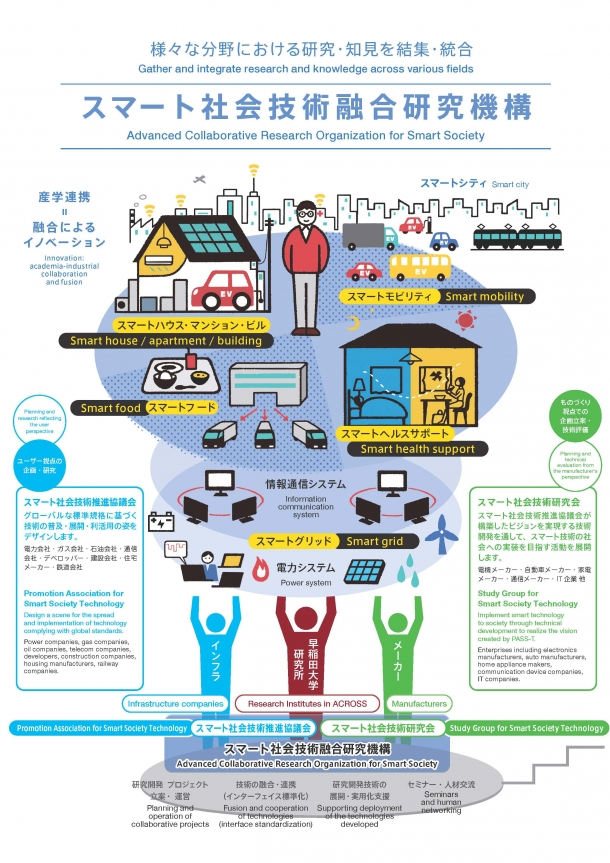 The application of continuously developing and rapidly spreading ICT has progressed in the fields of energy, housing, mobility/transportation, health, and food that continue to shape our lives. Correspondingly, smart technologies have been incorporated into this development. Each field should be able to support a vibrant society based on people-centered collaborations, but research to date has often been conducted within individual fields.
The application of continuously developing and rapidly spreading ICT has progressed in the fields of energy, housing, mobility/transportation, health, and food that continue to shape our lives. Correspondingly, smart technologies have been incorporated into this development. Each field should be able to support a vibrant society based on people-centered collaborations, but research to date has often been conducted within individual fields.
At the Advanced Collaborative Research Organization for Smart Society (ACROSS), we have built a platform of 12 research institutes that has accumulated and integrated the research and knowledge of Waseda University Professors in these four fields and mutually collaborated across fields.
We have also established the Promotion Association for Smart Society Technology (PASS-T) and the Study Group for Smart Society Technology (SGSS-T) as organizations for industry–academia collaborations. Through the activities based on these research platforms, we promote the implementation of developed technologies in society and continue leading innovation efforts.
ACROSS aims to realize excellent achievements demanded by society through the formation of a “forum” wherein “people” can interact and “technology” can bloom. Therefore, we are promoting the following activities with members of the Promotion Association for Smart Society Technology and the Study Group for Smart Society Technology (FY 2023).
We are also involved in a wide range of activities, including establishing and hosting the Energy Resource Aggregation Business (ERAB) Forum in collaboration with the ERAB Study Group of the Ministry of Economy, Trade and Industry (METI), promoting national projects and joint research with individual companies.
Furthermore, we are making efforts to strengthen the collaboration between research institutes and create an environment where collaboration between corporate members and research institutes can become more active.

In addition to the efficiency of the construction itself, energy management systems as HEMS, MEMS (Mansions Energy Management System) and BEMS are applied for the dwelling environment optimization.
In controlling the lighting and the air conditioning, the lighting environmental (photobiology approach), physiological approach and biological rhythm (chronobiology approach) are used to realize the comfortable and healthy living environment.
With the coordination between the Electric Vehicle (Hybrid vehicle, Electric vehicle, plug-in hybrid vehicle and Fuel cell vehicle, and so on) with high environmental compatibility and the infrastructure technology as smart grid, the optimization of the logistics and the charging functions is aimed.
The mission is to conduct and disseminate cutting-edge research that facilitates the realization of more sustainable food and energy systems both in Japan and internationally.
Upgraded Smart Grid system with demand response and negawatt power transaction will be realized by using the global standard communication system.